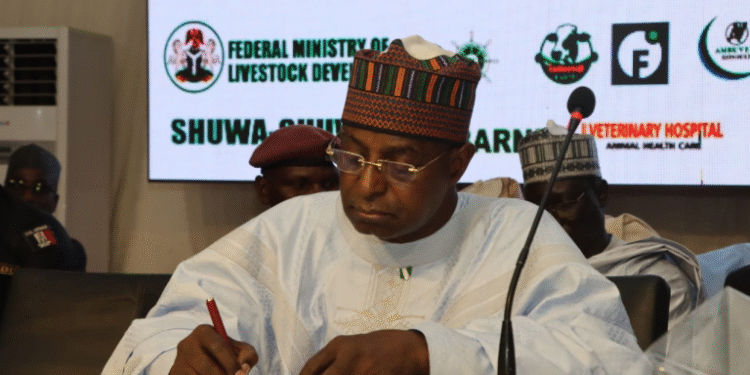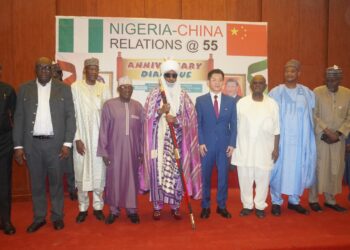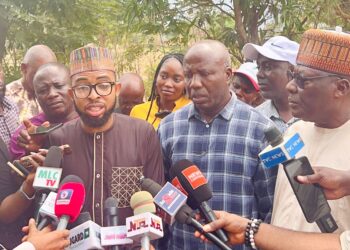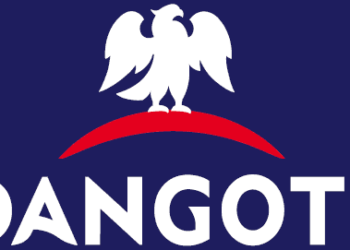The Federal Government has inaugurated the National Council on Livestock Development (NCLD), a high-level policy and coordination body designed to drive comprehensive reforms and unlock billions of dollars in investments across Nigeria’s livestock economy.
The Council, launched at its maiden meeting in Yola, marks what officials describe as the most ambitious transformation of the sector in decades, focusing on modernisation, commercialisation, value-chain optimisation and sustainable conflict reduction.
Idi Mukhtar Maiha, Minister of Livestock Development, said the administration was pursuing an aggressive growth plan expected to expand the livestock industry from its current $32 billion value to $74 billion within five years.
The strategy, anchored on the newly unveiled National Livestock Growth Acceleration Strategy (NL-GAS) and backed by the National Livestock Master Plan, is attracting strong interest from multinational and local firms.
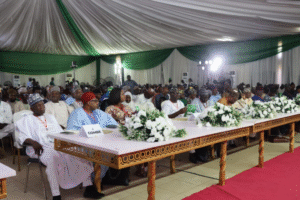
Mr Maiha revealed that negotiations were ongoing with global and indigenous giants, including farms, for major investments in dairy, beef, fodder cultivation, breeding services, poultry, piggery, and traceability systems.
He added that development partners were already funding dairy pilot schemes, climate-smart livestock systems, and peacebuilding initiatives, with more support expected as the NCLD provides stronger policy alignment.
Previous reform attempts were slowed by fragmented policies across different levels of government.
Highlighting achievements recorded within the ministry’s first year, Mr Maiha listed the registration of eight new pasture species, the first in nearly half a century; the completion of a National Strategy on Animal Genetic Resources; and the deployment of solar-powered cold-chain vaccine rooms, boreholes, dips, milk collection centres and slaughter slabs under the L-PRES programme.
He also announced the rehabilitation of laboratories at the National Veterinary Research Institute (NVRI), Vom, which is increasing vaccine production capacity from 120 million to 850 million doses annually, and the commissioning of the Wase Livestock Village, a model for transforming 417 national grazing reserves into modern ranch-based livestock settlements equipped with schools, clinics, water systems, pasture fields, and processing hubs.

According to him, upgrading grazing reserves and promoting ranching remain central to ending recurrent farmer-herder conflicts and building commercially viable livestock communities, with nearly half of Nigeria’s states now operating dedicated livestock ministries or agencies.
The newly-inaugurated NCLD is expected to harmonise national strategies, coordinate investments, strengthen veterinary services, and modernise livestock production systems to boost economic growth and reduce conflict pressures.
Governor Ahmadu Umaru Fintiri of Adamawa State used the occasion to reiterate the state’s leadership in livestock development, stating that Adamawa created a dedicated livestock ministry 20 years ahead of national adoption.
Governor Fintiri, represented by his deputy, Professor Kaletapwa Farauta, outlined numerous reforms undertaken by his administration, including the rehabilitation of 69 grazing reserves, modernisation of livestock markets, construction of dams and watering points, establishment of artificial insemination centres, and strengthening of veterinary and public health systems.
While identifying climate change, disease outbreaks, and herder-farmer conflicts as persistent challenges, he appealed for renewed federal support, particularly the reconsideration of Adamawa’s 2024 Natural Resource Fund application and funding for its Model Demonstration Pilot Ranch under the National Livestock Transformation Plan.
Governor Fintiri expressed optimism that the Council’s deliberations, held under the theme “Livestock Rebirth: Accelerating Renewed Hope”, would produce inclusive and sustainable solutions for the sector.
In their goodwill messages, the Chairmen of the Senate and House Committees on Livestock, Musa Mustapha and Tasir Raji, pledged strong legislative backing for the livestock transformation agenda.
They promised that the National Assembly would introduce new bills to strengthen value chains, regulate land use, advance ranching reforms, and enhance investor confidence across the sector.
Source – Radio Nigeria
(vitalnewsngr.com)


